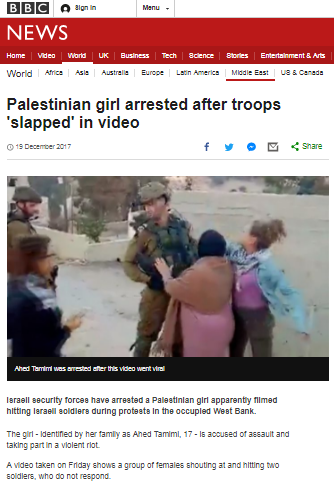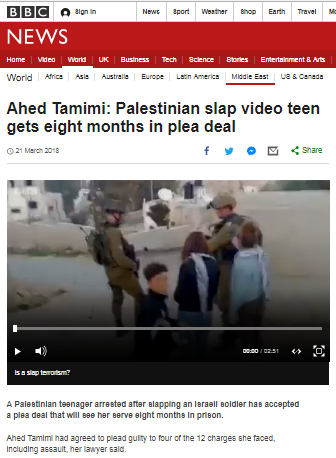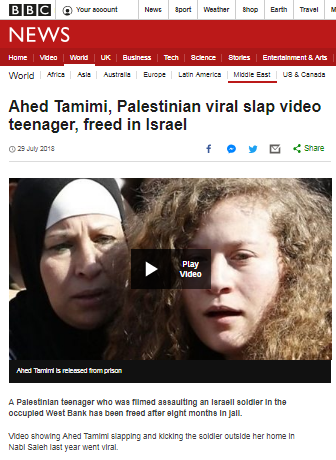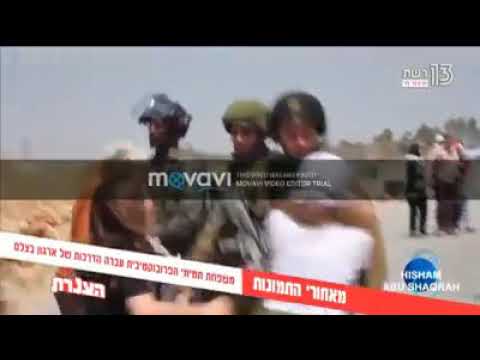As the year’s end approaches we will be taking a look at some of the topics that the BBC chose to promote during 2018 in a manner that went beyond ordinary reporting both in terms of the amount of content produced and adherence to standards of ‘due impartiality’.
One of the BBC’s campaigns began in late December 2017 and continued until March 21st 2018, with an encore on July 29th. It related to Ahed Tamimi who, together with other members of her ‘activist’ family, had been featured in BBC content in the past.
However, in this case the supposedly ‘impartial’ BBC elected to lend its voice – and considerable outreach – to promotion and amplification of a blatantly political campaign.
19th December 2017, BBC News website:
Palestinian girl arrested after troops ‘slapped’ in video
Palestinian girl arrested after ‘slap’ video
Both items discussed here.
“To sum up, the BBC’s ‘reporting’ on this story promotes – twice – filmed footage for the most part produced by family members of the story’s main protagonist, two Facebook posts from her father, one article from a notoriously partisan and inaccurate media outlet quoting her aunt, one Ynet report quoting her father and a second Ynet report relating to a previous incident in which she was involved.”
1st January 2018, BBC News website:
Palestinian girl charged after slapping soldier on video
Discussed here.
“Notably, while the BBC did elect to amplify the Tamimi family’s claim of “legitimate resistance” and to inform its audiences that “many Palestinians have hailed Tamimi as a hero of the resistance to Israeli occupation”, it refrained from telling them of her support for terrorism and advocacy of the murder of Israelis.”
1st January 2018, BBC World Service radio, ‘Newshour’, Yolande Knell:
Discussed here.
“…the BBC’s Yolande Knell was already aware of the charge of incitement.”
3rd January 2018, BBC Radio 4, ‘Today’:
Discussed here.
“No mention of the additional charges of rock-throwing and incitement was made throughout the item, which included interviews with Israeli MK Dr Michael Oren and B’tselem’s research director Yael Stein. Neither were listeners told that Ahed Tamimi’s mother Nariman has collaborated (along with additional members of the family) with B’tselem’s ‘armed with cameras’ project.”
8th January 2018, BBC Radio 4, ‘Today’, Yolande Knell:
Discussed here.
In this report from Yolande Knell, listeners heard from former IDF chief prosecutor Maurice Hirsh who noted the charge of incitement against Ahed Tamimi. They also heard interviews with an Israeli MK, Tamimi’s lawyer, Tamimi’s father and statements from a member of an anti-Israel NGO.
“Significantly, although the video footage of Ahed Tamimi urging others to carry out acts of violence is in the public domain, it has not been presented to BBC audiences.”
17th January 2018, BBC News website, Yolande Knell:
Ahed Tamimi: Spotlight turns on Palestinian viral slap video teen
Discussed here.
“The four interviewees who appeared in Knell’s audio report – Ahed Tamimi’s lawyer Gabi Lasky, her father Bassem Tamimi, Israeli MK Anat Berko and former IDF chief prosecutor Lt-Col (res) Maurice Hirsch – are also quoted in this written report.”
31st January 2018, BBC One, BBC News channel, BBC News website, Jeremy Bowen:
Ahed Tamimi: Was Palestinian teenager’s ‘slap’ terrorism?
Both discussed here.
“Clearly both those headlines and presentations suggest to BBC audiences that Ahed Tamimi has been charged with terrorism following her assault of a soldier – but that disingenuous implication is false.”
5th February 2018, BBC World Service radio, ‘Newshour’, Jeremy Bowen:
Discussed here.
13th February 2018, BBC News website:
Ahed Tamimi: Palestinian viral slap video teen goes on trial
Discussed here.
“However, as has been the case in the majority of the BBC’s copious past reporting on Ahed Tamimi’s arrest and indictment, this article too failed to provide readers with details of her call for violence on social media which is the basis of that incitement charge.”
13th February 2018, BBC World Service radio, ‘Newshour’, James Reynolds:
Discussed here.
“All the more significant is the fact that he [Reynolds] failed to inform listeners of Ahed Tamimi’s “message to the world” – as defined by her mother – in that same footage which included the call for violence that is the basis for the charge of incitement against her.”
21st March 2018, BBC News website:
Ahed Tamimi: Palestinian slap video teen gets eight months in plea deal
Discussed here.
“…BBC audiences were not informed in this report that the charge of incitement relates to the fact that in the same video produced and distributed by her mother in which Ahed Tamimi was filmed assaulting soldiers, she also made a call for violence.”
Between December 19th 2017 and March 21st 2018, the BBC produced at least thirteen written, filmed or audio reports on that topic: clearly an unusual volume of coverage clearly intended to secure audience attention.
All the written and filmed reports (eight) included the word “slap” (or derivatives) in their title – an indication of what the BBC wanted audiences to think the story was about and how perception of the story was manipulated. Several of the reports told BBC audiences that Tamimi was imprisoned because of a ‘slap’ while failing to adequately explain – or even mention – the most serious charge against her: that of incitement to violence. Only one of the reports (BBC Radio 4, January 8th) provided audiences with a reasonable explanation of the charges against Tamimi.
The reports included interviews with three different Israeli politicians and one former IDF chief prosecutor. In addition to numerous interviews with Ahed Tamimi’s father – together with links to the family’s social media platforms – and quotes from her lawyer, BBC reporting on this story promoted quotes from and campaigns run by inadequately presented partisan political NGOs and activists such as B’tselem, Jonathan Pollack, Amnesty International, Avaaz (including a link to a petition set up by Tamimi’s father) and Human Rights Watch.
The BBC returned to the story in late July, with the same editorial policies in evidence in four additional reports.
29th July 2018, BBC News website:
Ahed Tamimi, Palestinian viral slap video teenager, freed in Israel
Discussed here.
“…once again BBC audiences were not informed in this report that the charge of incitement to which Ahed Tamimi pleaded guilty relates to the fact that in the same video produced and distributed by her mother in which she was filmed assaulting soldiers, she also made a public call for violence.”
29th July 2018, BBC World News TV, Nida Ibrahim:
Discussed here.
29th July 2018, BBC News website, Nida Ibrahim:
Discussed here.
“In the film itself the charge of incitement was likewise entirely erased from audience view.”
29th July 2018, BBC World Service radio, ‘Newshour’, Nida Ibrahim:
Discussed here.
“As has been the case in all the BBC’s coverage of this latest instalment of the Ahed Tamimi story, the fact that the charge of incitement was the most serious of the charges against her – and its details – was erased from audience view.”
Throughout the BBC’s generous coverage of this story, audiences saw her described as “a prominent child activist“, a “star on social media”, “a modern-day Joan of Arc“, “a symbol of resistance to Israeli occupation“, “a national icon” and “the new iconic face of Palestinian resistance“.
BBC audiences were told that Tamimi is to be seen as “standing up to the reality of Israeli occupation, defending her home with her bare hands” and “standing up to armed soldiers on occupied land” and that her aim is “to resist the occupation“.
The one-sided politicised campaigning that BBC audiences saw instead of objective coverage of this story is a slap in the face for journalism and – not least in light of the BBC Middle East editor’s campaign contribution – detrimental to the BBC’s reputation as a trustworthy media outlet committed to accurate and impartial reporting.
Related Articles:
BBC reporter’s Tweets breach impartiality guidelines
BBC brushes off a complaint about a journalist’s Tweets
The BBC ME editor’s response to criticism of his recent reporting
BBC’s ‘Hardtalk’ hosts Ahmad Tibi – part one
BBC Arabic producer breaches social media guidelines again





